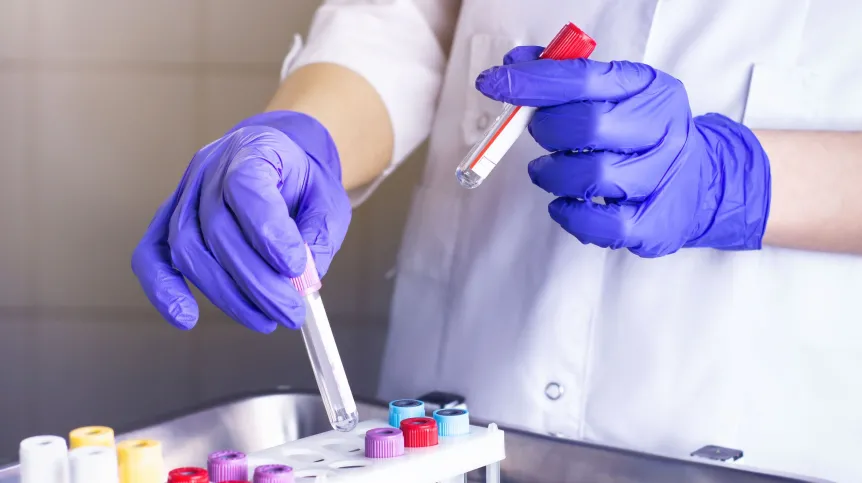
A simple test developed by a Polish-American team may allow in the future to assess the risk of breast and ovarian cancer without the need for genetic testing, and thus, be more widely available and cheaper, the journal Nature Communications reports.
The researchers from Dana-Farber Cancer Institute (DFCI) and the Medical University of Lodz (MUL) demonstrated (https://doi.org/10.1038/s41467-023-38925-4) that a specific combination of serum microRNA indicates an increased risk of cancer development in the future. DNA sequencing is not required to directly identify cancer-promoting BRCA1 and BRCA2 mutations. Instead, it is enough to detect its consequences: disturbed cellular processes related to these proteins.
The normal BRCA1 and BRCA2 genes belong to the DNA repair-regulating pathway. They are responsible for the production of proteins capable of repairing damaged DNA in cells. Some BRCA1 i BRCA2 mutations cause disturbance to the gene repair, which leads to further genome damage and, consequently, to breast, ovarian, prostate or pancreatic cancers.
In Poland, as in most developed countries, genetic testing is available to patients with a known familial history of the cancers in question. The risk-reducing surgical interventions, salpingo-oophorectomy or mastectomy, are the opportunities available to BRCA1/2 mutation carriers. Alas, only ~10% of them are aware that they are BRCA1/2 mutation carriers.
'For the first time, we have found a signal in the blood to detect pathology associated with increased cancer risk', says senior author and Dana-Farber researcher Dipanjan Chowdhury.
According to the authors, this new method could become the basis for widely available, cheaper and simpler tests to identify the risk of hereditary cancers.
In Poland, as in most developed countries, genetic testing is available to patients with a known familial history of the cancers in question. The risk-reducing surgical interventions, salpingo-oophorectomy or mastectomy, are the opportunities available to BRCA1/2 mutation carriers. Unfortunately, only approx. 10% of them are aware that they are BRCA1/2 mutation carriers.
'The aim of the project was to find a solution which could enable a population-scale identification of cancer risk without prohibitively costly methods', says Professor Wojciech Fendler from Medical University of Lodz, corresponding author of the paper. 'The microRNA discussed in the paper by Elias and Smyczyńska demonstrates that such a tool is feasible', he adds.
MicroRNA are small, single-stranded, RNA molecules with a specific structure. Their biological functions include protein synthesis regulation, but this study focused on another aspect: pathological changes in the number of copies of specific serum microRNAs. A specified serum microRNA profile therefore indicates certain diseases.
653 samples were collected by 6 research teams from the USA, India and Poland and microRNAs were counted in each sample by RNA-sequencing. Next, Professor Wojciech Fendler’s team used bioinformatic and biostatic methods, including machine learning to identify the microRNA expression profile associated with BRCA mutations.
'The primary challenge in the project was to find the processing method for a large body of data of varied technical quality and clinical characteristics. The elimination of non-biological sources of variation allowed us to define which microRNAs are associated with impaired DNA repair and can be used as a diagnostic test', says Dr. Urszula Smyczyńska, the first author of the paper.
According to the press release, the designed model can correctly identify patients with germline BRCA1/2 mutations with 94% sensitivity. Since the presented models rely on micro-RNA sequencing, they cannot yet be used in screening tests. However, they do provide the background for the tool calibration, for example by means of qPCR technique, the very same one that is applied in COVID-19 testing.
The teams led by Chowdhury and Fendler have shown that the identified microRNA profile provides more information than the sequencing of BRCA1/2 or other DNA repair-related genes alone. It appears that the results show the functional effect of genetic variations regardless of which gene is affected by mutation.
'We are constantly discovering new genes and mutations that could impact this pathway, so it is hard for genetic testing to keep up. A test that is independent of that, that shows you have a problem in the pathway, could more broadly identify people at risk', says Chowdhury.
Further research conducted by both teams will focus on calibration of the test for practical use and testing its effectiveness in population screening.
The research was funded by Dana-Farber / Harvard Cancer Center Ovarian Cancer SPORE, the National Institutes of Health, the National Cancer Institute, the Massachusetts Life Sciences Center Bits to Bytes Program, the Deborah and Robert First Family Fund, the Honorable Tina Broman Foundation, the V Foundation, the Mighty Moose Foundation, and the DST-UKERI (the Government of India Department of Science and Technology and the UK-India Education and Research Initiative). (PAP)
PAP - Science in Poland, Paweł Wernicki
pmw/ agt/ kap/
tr. RL













